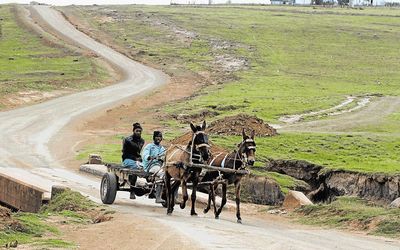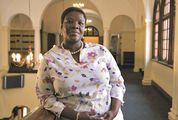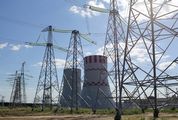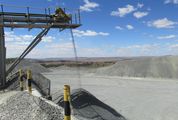Search for common ground in land-reform debate
by Brian Whittaker,
2016-03-15 05:47:18.0
WHAT is the courageous conversation we are not yet having with the unknown future — the world that lies over the horizon, but has not yet been fully articulated? The poet, David Whyte, wants to know.
We are not good at these conversations because they take us into the unknown. But in a world in distress, they are the conversations we must have if we are to move beyond a sense of foreboding to charting a new course.
This is true for many areas of South African life: economic growth, poverty, inequality, race, land. It is difficult to see what lies beyond the horizon, and there is a growing sense of unease about our future.
With these concerns in mind, a group of South Africans got together at the beginning of last year to think about the future of land reform. There is widespread dissatisfaction with the process to date. It is proceeding too slowly to meet escalating expectations.
While the promise of a large-scale asset transfer programme is that it can improve incomes, reduce poverty, enhance livelihoods and reduce inequality, the results are often disappointing. The economic productivity of transferred land collapses; jobs are lost, local economies are damaged and food security is threatened.
There are disagreements about what land reform should try to do: restore rights; change the pattern of land ownership; improve livelihoods; create a small-scale farmer class; deracialise commercial agriculture.
And about where the priority should lie: restitution for those who can prove historical dispossession; tenure reform for 19-million people living in communal areas and on commercial farms; redistribution to black South Africans to rebalance the racial profile of land ownership.
There are also disagreements about how this should be done to focus on the relative roles of the market and the state and the public and private sectors.
Throw into the mix sketchy policy prescriptions that are often contested, and resources that are meagre in relation to political promises, and it is not surprising that what lies beyond the horizon is uncertain. Discussions of these issues are conducted in short bursts. Views that don’t accord with our own are dismissed as unworkable.
...
THE group that was convened a year ago to think about the future of land reform included people with different views: senior government officials with responsibilities for land reform and finance; executives of private land-owning companies; human rights lawyers, traditional leaders, members of community-based organisations, leaders of communal property associations, religious leaders, and transaction advisers.
They were invited to start a conversation from a new perspective: to stand back from trying to persuade one another about their particular points of view and see if they could agree on a handful of alternative scenarios about how land reform might play out in the next 15 years.
They were asked to start, not by giving lectures about their areas of expertise, but by talking about what they are most uncertain about. Over a year of residential workshops, interviews and consultations, four scenarios were created that this diverse group believes tell important stories about what could happen.
All of the stories start in the difficult reality of SA in 2016. Growth is slow, and poverty and inequality cast a shadow over the young democracy. The ruling party is under rising political pressure. Businesses are in decline, with farming hard-hit. The rural poor struggle to secure the necessities of life in the face of drought and water shortages. The scenarios tell stories about how South Africans might respond to these challenges.
The first story "connection and capture" unfolds as the ruling party tries to shore up support ahead of the 2019 elections. By acceding to traditional leaders’ demands for control of land in communal areas, they hope to mobilise votes.
The party survives the elections. Some traditional leaders use their new power to develop their people, others enrich themselves. At the same time the number of restitution claims exceeds expectations. Weak institutions allow the politically connected to capture land reform for their own purposes.
The "market power and concentration" story develops as the government seeks private sector partners to accelerate land reform. The objective of changing the profile of land ownership is achieved by 2030, with black South Africans owning half of the commercial farm. The number of farms has declined significantly. The racial profile has changed, but the structure of agriculture is unaffected.
...
THE "occupation and confiscation" scenario turns on a failure by leaders to agree on a viable strategy. Instead, they blame one another for SA’s woes. There is a campaign of land invasion in the face of deepening hardship. The government sides with opposition parties to allow confiscation without compensation. The move backfires and, by 2030, the ruling party has lost power. Confiscated land is in the hands of black South Africans, but the constitutional framework for dealing with land has gone. The future is uncertain.
The "hard bargaining and compromise" scenario is triggered by rising pressure and declining resources. The government is driven to reconceptualise the land-reform programme as a pro-poor initiative, with incentives designed to channel the resources of the private sector and civil society into the programme. They don’t have it all their own way. Neither do other interests, as compromises are hammered out. By 2030, land ownership is more widely spread and small-scale commercial farmers are developing alongside larger farming enterprises.
These scenarios are not forecasts of what will happen or proposals for what should happen. They are stories about what could happen under different circumstances. They are designed to trigger thinking about a future that is coming at us faster than we will be able to respond if we don’t make time for the courageous conversation.
• Whittaker is executive director of the Vumelana Advisory Fund and convenor of the Land Reform Futures scenarios team. The scenarios will be available at landreformfutures.org

Picture: DAILY DISPATCH
WHAT is the courageous conversation we are not yet having with the unknown future — the world that lies over the horizon, but has not yet been fully articulated? The poet, David Whyte, wants to know.
We are not good at these conversations because they take us into the unknown. But in a world in distress, they are the conversations we must have if we are to move beyond a sense of foreboding to charting a new course.
This is true for many areas of South African life: economic growth, poverty, inequality, race, land. It is difficult to see what lies beyond the horizon, and there is a growing sense of unease about our future.
With these concerns in mind, a group of South Africans got together at the beginning of last year to think about the future of land reform. There is widespread dissatisfaction with the process to date. It is proceeding too slowly to meet escalating expectations.
While the promise of a large-scale asset transfer programme is that it can improve incomes, reduce poverty, enhance livelihoods and reduce inequality, the results are often disappointing. The economic productivity of transferred land collapses; jobs are lost, local economies are damaged and food security is threatened.
There are disagreements about what land reform should try to do: restore rights; change the pattern of land ownership; improve livelihoods; create a small-scale farmer class; deracialise commercial agriculture.
And about where the priority should lie: restitution for those who can prove historical dispossession; tenure reform for 19-million people living in communal areas and on commercial farms; redistribution to black South Africans to rebalance the racial profile of land ownership.
There are also disagreements about how this should be done to focus on the relative roles of the market and the state and the public and private sectors.
Throw into the mix sketchy policy prescriptions that are often contested, and resources that are meagre in relation to political promises, and it is not surprising that what lies beyond the horizon is uncertain. Discussions of these issues are conducted in short bursts. Views that don’t accord with our own are dismissed as unworkable.
...
THE group that was convened a year ago to think about the future of land reform included people with different views: senior government officials with responsibilities for land reform and finance; executives of private land-owning companies; human rights lawyers, traditional leaders, members of community-based organisations, leaders of communal property associations, religious leaders, and transaction advisers.
They were invited to start a conversation from a new perspective: to stand back from trying to persuade one another about their particular points of view and see if they could agree on a handful of alternative scenarios about how land reform might play out in the next 15 years.
They were asked to start, not by giving lectures about their areas of expertise, but by talking about what they are most uncertain about. Over a year of residential workshops, interviews and consultations, four scenarios were created that this diverse group believes tell important stories about what could happen.
All of the stories start in the difficult reality of SA in 2016. Growth is slow, and poverty and inequality cast a shadow over the young democracy. The ruling party is under rising political pressure. Businesses are in decline, with farming hard-hit. The rural poor struggle to secure the necessities of life in the face of drought and water shortages. The scenarios tell stories about how South Africans might respond to these challenges.
The first story "connection and capture" unfolds as the ruling party tries to shore up support ahead of the 2019 elections. By acceding to traditional leaders’ demands for control of land in communal areas, they hope to mobilise votes.
The party survives the elections. Some traditional leaders use their new power to develop their people, others enrich themselves. At the same time the number of restitution claims exceeds expectations. Weak institutions allow the politically connected to capture land reform for their own purposes.
The "market power and concentration" story develops as the government seeks private sector partners to accelerate land reform. The objective of changing the profile of land ownership is achieved by 2030, with black South Africans owning half of the commercial farm. The number of farms has declined significantly. The racial profile has changed, but the structure of agriculture is unaffected.
...
THE "occupation and confiscation" scenario turns on a failure by leaders to agree on a viable strategy. Instead, they blame one another for SA’s woes. There is a campaign of land invasion in the face of deepening hardship. The government sides with opposition parties to allow confiscation without compensation. The move backfires and, by 2030, the ruling party has lost power. Confiscated land is in the hands of black South Africans, but the constitutional framework for dealing with land has gone. The future is uncertain.
The "hard bargaining and compromise" scenario is triggered by rising pressure and declining resources. The government is driven to reconceptualise the land-reform programme as a pro-poor initiative, with incentives designed to channel the resources of the private sector and civil society into the programme. They don’t have it all their own way. Neither do other interests, as compromises are hammered out. By 2030, land ownership is more widely spread and small-scale commercial farmers are developing alongside larger farming enterprises.
These scenarios are not forecasts of what will happen or proposals for what should happen. They are stories about what could happen under different circumstances. They are designed to trigger thinking about a future that is coming at us faster than we will be able to respond if we don’t make time for the courageous conversation.
• Whittaker is executive director of the Vumelana Advisory Fund and convenor of the Land Reform Futures scenarios team. The scenarios will be available at landreformfutures.org
























Change: 0.83%
Change: 0.93%
Change: 0.95%
Change: 0.73%
Change: 1.91%
Data supplied by Profile Data
Change: 0.58%
Change: -0.21%
Change: 0.83%
Change: 0.00%
Change: -0.23%
Data supplied by Profile Data
Change: 0.43%
Change: -0.03%
Change: 0.13%
Change: -0.07%
Change: 0.12%
Data supplied by Profile Data
Change: -0.24%
Change: 0.10%
Change: -0.46%
Change: 1.59%
Change: 3.03%
Data supplied by Profile Data